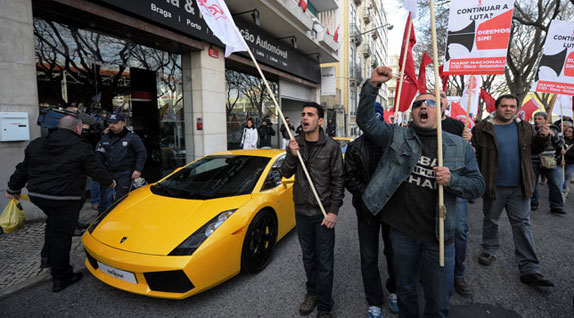 Francisco Leong/AFP/Getty Images
Francisco Leong/AFP/Getty Images
Personals from the Editor
Europe is facing financial Armageddon. Will it survive?
Learn the why behind the headlines.
Subscribe to the Real Truth for FREE news and analysis.
Subscribe NowThe continent of Europe is in its worst crisis since World War II—one which threatens to destroy it. Think of headlines describing riots—violence—debt—entitlement cutbacks—banks—and bailouts! Long-established financial institutions are in trouble. Millions are unemployed, with little hope of a job. And millions of jobs are at risk. More and more lives are simply shattering. Extreme social unrest is brewing. Angry, frustrated people are taking to the streets in violent protests against their governments—some of which have already fallen. Others are faltering. Entire nations face bankruptcy. The existence of the European Union hangs in the balance.
Leaders are frantically searching for solutions, but to no avail. Europe is facing financial Armageddon. Will it survive? And how will the crisis ultimately affect the world? Europe will come together! The stage is rapidly being set, with economics the catalyst for what is coming. The Bible has much to say about where this is leading.
Unprecedented Financial Crisis
Everything that occurs on planet Earth is subject to a great unseen law—that of cause and effect. For every cause, there is one or more effects. Most people can see these effects—good or bad—but cannot trace them back to their origin—the cause that produced them. Europe is suffering from a host of effects—mostly BAD! There are causes behind these effects.
 Jose Jordan/AFP/Getty Images
Jose Jordan/AFP/Getty ImagesThis Personal examines the causes—the why—of Europe’s financial problems. Once you understand this, you can know where Europe is going—you can know how conditions, trends and events will end. Europe is on a collision course with PROPHECY! But some background is necessary.
The situation in Europe is nearly apocalyptic, and the stakes have never been higher. Many European nations simply cannot repay their debts, while at the same time their economies are slowing, and tax revenue is decreasing. Worse, it is harder and harder to borrow more money. With giant debt loads hanging over these countries, Europe is running out of options. Analysts now warn of impending bank failures. According to one executive at a major global bank, “If anyone thinks things are getting better then they simply don’t understand how severe the problems are” (Telegraph).
First is the growing distrust between banks, which are withdrawing deposits from one another and placing them with the European Central Bank (ECB). In December 2011, deposits there were at an all-time high of 905 billion euros! And many banks are becoming dependent on funding from their own central banks—so-called taxpayer-funded “zombie banks.”
As of December 2011, there is also a mammoth 115 billion euro capital shortfall in the eurozone’s banking system. Banks have run out of proper forms of collateral needed to finance short-term loans, and are instead digging into their gold reserves—a last ditch emergency option. A collateral crunch lies ahead!
Europe’s financial system is so unstable that few experts any longer believe that the European Union has the funds to address the banks’ problems. Even if the bailout funds were raised to a trillion euros, some warn this would only help Italy and Spain—just two of 27 EU members. What happens when other countries need bailouts?
Europe’s banks are facing a crisis of immense proportions. A collapse of at least one major European bank is more than a possibility, it is imminent. When this happens, Europe’s financial sector will plunge into chaos, because its economies are already teetering on the edge.
 Georges Gobet/AFP/Getty Images
Georges Gobet/AFP/Getty Images
Growth is stagnant—and some economies are shrinking. Again, countries are falling deeper into debt as tax revenue is insufficient and borrowing costs increase. Italy’s borrowing rate is at 5.4 percent. Greece’s, Ireland’s and Portugal’s are way over 7 percent—with Greece’s at over 20 percent!
Several countries have unemployment rates over 10 percent, with some over 20 percent. Others have over 20 percent unemployment rates just among youth. With jobs vanishing and others threatened, labor unions are on the march. In certain countries, relations between governments, capital and labor are very bad and growing worse.
At Europe’s time of greatest need, its leaders hold summit after summit, with little decisive action resulting. Europeans are searching for a champion—a bold, confident, courageous leader with the vision to deliver them from their troubles. While little consensus has been made about proposed solutions, most agree on one thing: Europe faces its darkest hour since the second world war.
Spreading Economic Contagion
Consider just some European countries and their challenges, starting with Greece. As of early 2012, Greece’s debt stands at 340 billion euros—by far the largest debt in the history of this nation of only 11 million. This equals a staggering 31,000 euros for every Greek man, woman and child. In 2010, Greece received a 110-billion-euro bailout. Yet this was not enough. So a second bailout was agreed upon.
Investors still fear that even the latest bailout will not cover Greece’s debts, which seem to be a bottomless pit. If Greece runs completely out of money, French and German banks will be stuck with billions of euros in bad loans. These banks would then need a bailout by their governments! And America cannot help because its debt is today worse than Greece when size is factored in.
Investor confidence in Greece is so low its bonds are considered “junk.” This means the global financial community believes there is a high likelihood Greece will default. If so, the impact on Europe would be catastrophic!
Next is Ireland—which saw the collapse of its banking system after bad real estate investments. The government took over the country’s largest banks in an attempt to save them, and the International Monetary Fund and EU forced the nation to accept a bailout amounting to 85 billion euros. This was followed by the Irish government passing the toughest budget in its history. Yet more Irish bailouts are almost certain.
Then comes Portugal. Its shrinking, uncompetitive economy has severely reduced government tax revenue. This forced its Prime Minister to resign. To get a 78-billion-euro bailout, the new government passed tough austerity measures. This led to mass protests. Citing Portugal’s worsening economy, Moody’s credit rating agency has downgraded its status at least five times since 2009. Like Ireland, more bailouts will almost certainly be needed.
But these countries are tiny compared to much larger Spain and Italy.
Too Big to Fail?
Spain’s once booming real estate market has collapsed. Its banks have been left with a load of bad debt. Many are in serious trouble, leading to a recession in which the unemployment rate has passed 20 percent. Almost 50 percent of young Spaniards are not working!
Disillusioned with the lack of prospects, many are emigrating abroad—particularly the skilled and educated—the ones the country can least afford to lose! Spain’s borrowing rate reached record highs, forcing its government to adopt austerity measures. Spain’s economic outlook has been downgraded four times since 2009.
The biggest concern is Italy—the fourth-largest economy in Europe, with the highest debt load. Coupled with this, its economy is stagnant. And it is being charged 5.4 percent to borrow money. This is an astronomical rate for such a large nation—the eighth-largest economy in the world. Germany only pays a quarter of 1 percent!
If trends continue, it is only a matter of time before Italy cannot pay its debts. If a bailout is required, no country in Europe, or even its Central Bank, could afford it. The same with Spain.
Yet Italy and Spain are seen as too big to fail!
Other nations are suffering similar economic distress, with the contagion spreading across the continent. Huge pressure has been put on the euro, which is close to collapse as investors lose confidence.
When the euro was first established, its architects never imagined such a dire situation. What happened?
History of the Euro
Some review of the euro’s history is helpful. It was established in 1992 in a treaty agreed upon in Maastricht, Netherlands. At that time, all but three member nations decided to join. In 1999, the euro was created. In 2002, coins and notes came into circulation. Over time, other nations joined the EU, and adopted the euro.
The system progressed relatively smoothly until 2008, when the global economic crisis hit. Europe’s leaders implemented a 200 billion euro stimulus budget to boost growth. But the crisis lingered.
In 2009, the EU asked Ireland, Spain, France and Greece to reduce their large deficits. In late December 2010, Greece shocked the financial markets by admitting to debts of 300 billion euros. To put this into perspective, Greece’s debt was 113 percent of GDP—nearly double the limit set by the EU!
The crisis spread to larger European economies in 2011 such as Spain and Italy, whose borrowing costs rose sharply. To calm investors, Spain passed a measure to limit future deficits. Italy passed an austerity plan with the goal of a balanced budget by 2013.
To further buffer the crisis, the EU established a 500-billion-euro bailout fund, called the European Financial Stability Facility, or EFSF. This financed the Greek and Portuguese bailouts, but it was too small to bail out larger countries. And much of the fund is gone.
The EU as a whole forecasted growth of only 0.2 percent for the second half of 2011. But the private sector shrank for the first time in two years.
The situation is so grave that President of the European Commission Jose Manuel Barroso stated, “We are today faced with the greatest challenge our union has known in all its history” (BBC).
Vicious Cycle
Some wonder: why cannot European governments simply print money to repay debt? Let’s understand. Governments typically raise money by issuing bonds. These are essentially IOUs to interested investors whom the government promises to repay at a stated interest rate, with the main amount to be repaid at the bond’s date of maturity. Like stocks, investors can trade bonds. If they do not like a country’s prospects, they will sell that government’s bonds, driving the price down. If investors have less confidence in a country, the country’s borrowing rate increases. This is because investors see it as a riskier proposition.
But usually a country has some control over its currency. For example, it can print more money through a central bank to pay debt. This ability also gives the nation power to devalue its currency to increase the competitiveness of its economy. This puts individual countries largely in control of their destinies.
Let’s see how this works. Take a country with large debt. Its government orders the central bank to print a lot of money to pay off its debt. This explodes the country’s money supply and reduces the value of its currency. The principle of supply and demand is at work—the higher the supply, the lower the value, and vice versa.
Because investors do not like the country’s level of debt, they also sell its currency—further worsening its value. This reduces the value of the country’s exports, making them more competitive internationally. Its businesses can then sell more products and services—and make more money. This process kick-starts the economy, leading to businesses growing and generating jobs. The result is more income to tax and thus a higher government revenue stream. The government can start new projects, expand others, and pay its debt.
Having this control over its currency gives a government tremendous leverage in managing its finances. However, this is not the case with eurozone governments—nations which have adopted the euro. These do not have their own central banks. The eurozone only has the European Central Bank. Individual nations have fallen into what some European politicians call the “euro straightjacket.”
Countries tied together under just one bank represents an enormous problem. Consider. If a eurozone country is in economic trouble, their bonds become less attractive to investors. This is because of the country’s reduced ability to repay the bonds. Therefore investors sell them. This further lowers their value—and attractiveness—reducing the government’s ability to raise money through selling bonds since investors buy fewer. Investors move their funds to nations with stronger economies. For example, investors dump Greek bonds to buy German bonds.
When the country’s bonds become less desirable, it must raise the interest rate it pays investors to make them more attractive. Therefore, instead of being able to raise more money at low interest rates—and reduce debts—they must pay more money in interest—thus increasing their debts.
The cycle is vicious.
Shackled to the Euro
Struggling, debt-burdened countries are trapped inside the euro with no way to control their destinies. Money simply flows within the eurozone from strong economies to weak ones. Without the ability to manage the value of their currency or print more money, the economic condition of debtor nations only grows worse.
This is where Greece, Portugal, Ireland, Spain, Italy and other debtor nations find themselves. During the boom years, these nations lived beyond their means, borrowing large sums of money. With their economies in recession, they are unable to borrow more at low rates. They are instead told: “Reduce borrowing, raise taxes, and cut spending!” But this is the very thing driving them into recession. In turn, this drives up unemployment, resulting in more benefits paid and fewer incomes to tax. Never mind the resulting civil unrest, riots and violence from angry peoples unwilling to lose entitlements—who are unwilling to control their selfishness and laziness in pursuit of ridiculously early retirement, as well as other government benefits they have long suckled upon. It is blind greed that demands the right to receive money that future generations could never repay!
In the end, the current policy is self-defeating. These countries are trapped in a death spiral that threatens to bring down Europe and even the very global economy. Today, the foundation of the world’s financial markets is crumbling. European leaders are desperately trying to save their system. In meeting after meeting—summit after summit!—they try to find a way out of the abyss.
Opinions Abound
Many opinions exist about how the crisis should be solved. One idea is to contain the problem by acting conservatively and not taking drastic actions, instead implementing gradual reforms. This would at best have a limited impact, and would also lead to continued uncertainty in financial markets. Further erosion of confidence would continue pushing up borrowing rates. Many countries would be unable to pay debts or borrow enough to survive. The recession would only spread—and deepen.
A second option is to allow certain countries to default, but then manage their return to financial health. If Greece, Portugal, Ireland or other smaller countries defaulted, a customized solution could be implemented to help each economy recover. But this approach is dangerous as investors would suffer catastrophic losses, leading to a banking crisis of unimaginable proportions. Are you following the seriousness here? People are searching for a clear, strong hand!
A third possibility is to allow certain countries to voluntarily leave the euro—or force them out. The intention would be to let them take their problems with them—out of the eurozone. But their problems would remain, and would probably lead to currency devaluations and then collapse of their financial systems. This is because European economies have been deliberately interwoven to ensure reliance on one another, along with the strengthening of the union. There is no real mechanism to force—or let—countries out.
Some believe the EFSF should be increased for future bailouts of struggling countries. In fact, banks have already agreed to just write off half of Greece’s debt. There will be more write-offs for other countries.
Others believe since overspending caused the problem, the solution lies in offending countries adopting disciplined financial habits. They do not want more lending. They favor tough conditions applied before increasing loans. Germany and France are adamant that all struggling EU members must get their financial houses in order.
Those who favor enforcing financial discipline also want more integration between nations. They want “more Europe,” not less. This enables greater monitoring.
All solutions are painful. None are easy.
Growing Fiscal Union
In a December 2011 crisis summit, a major push toward integration changed Europe forever. Most member states gave up much of their sovereignty. Tax and spending plans must now be approved by the EU before their own governments do. Offenders will be automatically penalized. This was a huge step toward fiscal union!
A “two-speed” Europe is in motion—with two categories of EU membership. One is countries sharing the euro—those in the eurozone. The other is those that have opted out of the euro. In December, EU members failed to fully agree on treaty changes, partly because Britain vetoed it. (All 27 members must agree on every change.)
Britain’s main concern was the proposed tax on financial transactions. Since London is the largest financial center in Europe, this tax would be a giant 50 billion euros every year. Banks and insurance companies would almost certainly leave London. Britain wanted an exemption. Germany and France objected. In the end, Britain’s veto alienated it from the EU. The change was made as an intergovernmental treaty involving the 17 eurozone members.
Now a closer look at Germany’s position—the largest, wealthiest and most powerful economy in Europe. It has contributed the most to the bailouts of Greece, Portugal and Italy. What the Germans think and do is crucial to Europe’s destiny. Europe pivots around Germany.
For some time, Germany has called for a new treaty—with teeth to control member spending. Disputes would be decided by the European Court of Justice. Germany does not view bailouts as the answer. They fear that unbridled printing of money by the ECB will bring inflation. Think Weimar Republic, and the hyperinflation of the 1920s.
Germany is also against creating eurobonds—where member debts are pooled and sold to investors. They do not want responsibility for other nations’ debts. The average German hates seeing his hard-earned money support nations he sees as spendthrift, lazy and unproductive.
As the wealthiest economy in Europe, what Germany says matters. Financially stressed economies, desperate for more funds and bailouts, are looking to Germany for direction. They wait with bated breath on Germany’s every word.
Poland’s foreign minister summarized Europe’s dependence on Germany in a Berlin speech: “I demand of Germany that, for your sake and for ours, you help [the eurozone] survive and prosper. You know full well that nobody else can do it. I will probably be the first Polish foreign minister in history to say so, but here it is: I fear German power less than I am beginning to fear German inactivity” (BBC, emphasis added). Stunning words from a country that so recently suffered brutal German occupation!
One Source
As European leaders scramble to stabilize their union, Germany holds the cards. How will they be played? Will a cataclysmic financial collapse occur? If so, then what? Will Europe completely collapse—simply implode!—or will it survive, and even thrive? Everyone has opinions, but only one source provides real answers—the Bible!
God’s Word has accurately predicted the rise and fall of empires for millennia. For example, it predicted the rise of the Babylonian, Medo-Persian, Greek and Roman empires. It also foretold America and Britain’s greatness. What does the Bible reveal about Europe?
In Revelation 13, a mysterious Beast is described: “I [the apostle John] stood upon the sand of the sea, and saw a Beast rise up out of the sea, having seven heads and ten horns, and upon his horns ten crowns, and upon his heads the name of blasphemy” (vs. 1). This Beast is the Roman Empire, the most powerful empire the world has ever seen. This is why it is shown as a terrifying Beast, totally unlike anything before it.
Revelation 17 also speaks of a Beast. This one arises out of a bottomless pit, and is ridden by a woman. This is the Holy Roman Empire, which was the reconstitution of the ancient Roman Empire that fell in AD 476. The woman who rides it—called a whore—represents a great false church.
The revived Roman Empire was given the title “Holy Roman Empire” because it was guided by this powerful church. This “woman” church is described as committing fornication—political relations—with the kings of the earth (Rev. 17:2, 4). Ask: Which church has ambassadors to many nations around the world? Which church is synonymous with a nation-state?
The answer is obvious.
New Government
The Holy Roman Empire was prophesied to go through seven revivals. Six have come and gone. These were led by Justinian, Charlemagne, Otto the Great, Charles V and Napoleon, with the sixth revival culminating in Hitler and Mussolini. All six controlled Europe. One more revival is coming—in our time! Read my booklets Who or What Is the Beast of Revelation? and Revelation Explained at Last!
A 10-nation economic, political and military combine will arise in Europe and shock the world. Led by Germany, and more powerful than America, Russia or China, it will control Europe and dominate all nations. At its helm will be two men: a mesmerizing false religious leader the Bible calls the “false prophet,” and a charismatic civil leader who represents the Beast. This final union of church and state will bind Europe as never before.
While many politicians strive to bind Europe through finance, most miss the historical pattern that religion has been the only glue capable of bringing diverse peoples together. A tiny few do see this pattern. One may ask: Are not most Europeans cynical and apathetic toward religion—or even atheist or agnostic?
And how would an economic collapse unify Europe?
The Beast and False Prophet are foretold to galvanize Europe through miracles. These will be world-shaking—and not of God, but rather brought by Satan. The Bible calls them “lying wonders” (II Thes. 2:9). Watch for them! The False Prophet will unify the masses behind religion, while the Beast will solve the economic crisis. Together, they will take Europe from despair to incredible prosperity (Rev. 13:13-14; 16:13-14; 19:20)!
This coming system is called Babylon the Great. Revelation describes its immense wealth: “The merchandise of gold, and silver, and precious stones, and of pearls, and fine linen, and purple, and silk, and scarlet, and…wood, and…ivory, and…vessels of most precious wood, and of brass, and iron, and marble, and cinnamon, and odors, and ointments, and frankincense, and wine, and oil, and fine flour, and wheat, and beasts, and sheep, and horses, and chariots, and slaves, and souls of men” (18:12-13). Describing a return to the Roman practice of slavery, it concludes speaking of her “fruits” and “dainty and goodly” things which the masses, as it states, “lusted after” (vs. 14).
From the ashes of Europe’s financial crisis, a superpower will arise. It will sit astride the entire world like a colossus, dominating global trade. Just before Christ returns, prophecy reveals Europe will become the center of the world!!!
Watch Europe. By God’s authority, I tell you these things will happen!
More on Related Topics:
- How the Deadliest Attack on Russian Soil in Years Unfolded Over the Weekend
- Vladimir Putin Warns West of Risk of Nuclear War, Says Moscow Can Strike Western Targets
- With Lives Shattered by War, Ukrainian Teens Build New Dreams
- Ukrainians Prepare for a Long War. Will the West Stay the Course?
- One Year After Liberation, Ukrainians in Kherson Hold On to Hope amid Constant Shelling



